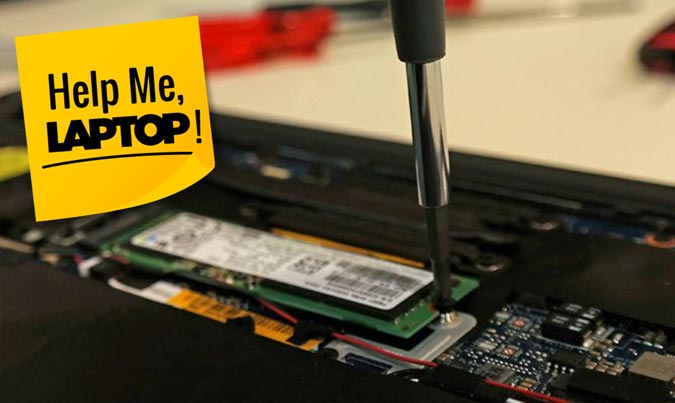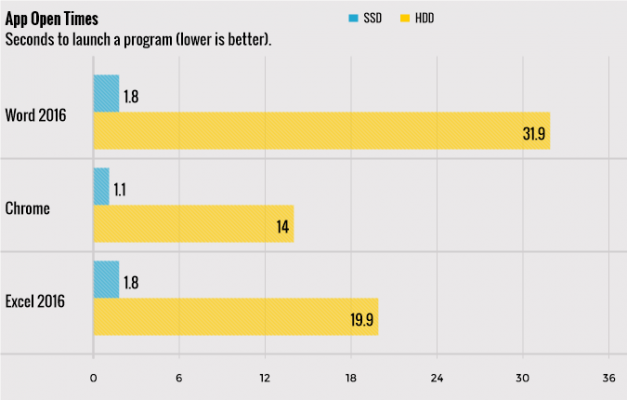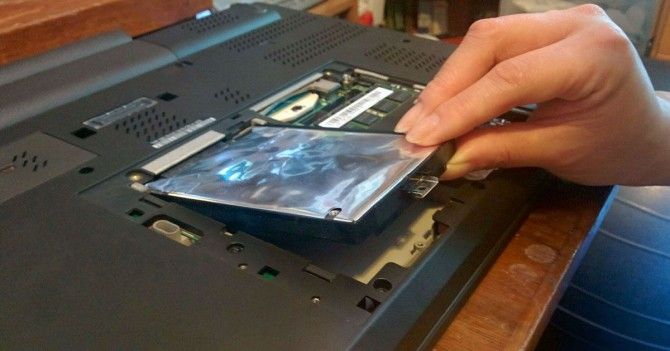Help Me, LAPTOP! Will an SSD Improve My Budget Laptop?
Forget about the CPU, RAM and graphics card. The component which has the most impact on your laptop's performance is its storage drive. Most mainstream and budget laptops today still use mechanical hard drives with magnetic media that spins around on a platter and a head that reads the data, much like the arm on a record player. While the platter spins, your CPU and RAM are left waiting for the data to arrive, which slows down everything from boot times to app opens and task switches. A Solid State Drive, which has no moving parts, makes the whole system faster by removing this latency.
On our forums, user Pacho21 asks if adding an SSD to his Asus EeeBook E202SA would significantly improve performance, including on general tasks such as surfing the web and multitasking. Our answer is "yes," but with a few caveats in this case.
With any laptop, the difference between an SSD and a hard drive is dramatic. In a series of application open tests we conducted last year, a Core i5 laptop opened Microsoft Word in 31.9 seconds with a hard drive, but just 1.8 seconds with an SSD installed. The open time for Chrome browser shrank from 14 seconds to 1.1 seconds and Excel went from 19.9 to 1.8 seconds after we upgraded.
It almost goes without saying that a computer would copy files faster with an SSD and it really does. When we ran our LAPTOP File Transfer Test, which involves copying 4.97GB of files, the hard drive operated at a rate of 33.9 megabytes per second while the SSD hit 237.8 MBps, which is about seven times as fast. Even the battery life improved with the SSD on board, going from 5 hours and 43 minutes to 7 hours and 9 minutes on the LAPTOP Battery Test (continuous surfing over Wi-Fi).
However, the Asus EeeBook E202SA is a low-cost laptop with low-end components, including an Intel Celeron N3060 CPU and 4GB of RAM. You can't turn a low-end computer into a performance system, just by upgrading to SSD. Web surfing, one of the main tasks Pacho21 mentions, is probably affected more by the CPU and network connection than the storage speed. That being said, your web browser does have to access the disk drive frequently, as it reads and writes cache files and when you open it.
There's no doubt that having an SSD would improve multitasking performance, but how much depends on the tasks you're performing. As you open new tasks and files, the SSD will, of course, speed that process along, but it will also help with Windows accessing its virtual memory file. Every computer has a "paging file" which it uses to store data when your programs are asking for more RAM than you have installed. So, if you have 15 tabs open along with Word, Excel and Photoshop Elements, your computer may need to access the paging file and can do so much more quickly with an SSD.
So should you upgrade a low-end laptop SSD? Yes, as long as it's possible. Not every laptop has a chassis that you can safely open without damaging the computer.
Sign up to receive The Snapshot, a free special dispatch from Laptop Mag, in your inbox.
The best way to find out if you can upgrade your laptop is to check Crucial Memory's Advisor Tool, which has a comprehensive list of what's possible with every make and model of laptop. According to Crucial, the Asus E202SA can take a standard 2.5-inch SATA SSD.
Even better, a 256GB SSD is extremely affordable, with decent models like the Samsung 850 EVO available for $100 or less. So good luck upgrading and make sure to check out our article on how to upgrade your laptop to SSD
Buy Samsung 850 EVO on Amazon.com
Laptop Upgrade Guide
- How to Tell If You Can Upgrade Your Laptop
- How to Install an mSATA SSD Boot Drive
- How to Upgrade Your Laptop’s Hard Drive to an SSD
- How to Install an M.2 SSD in the Lenovo ThinkPad T440s
- How to Upgrade the RAM on the Lenovo ThinkPad T440s
- How to Upgrade the RAM (Memory) on a Laptop
- How to Upgrade the SSD in Your MacBook Pro
- How to Upgrade Your Alienware 17’s SSD and Hard Drive
- How to Upgrade Your Alienware 17's RAM
- How to Upgrade Your Dell XPS 13's SSD
- How to Upgrade Your ThinkPad 13's RAM
- How to Upgrade Your ThinkPad 13's SSD
- How to Upgrade Your ThinkPad T460s' RAM
- How to Upgrade Your ThinkPad T460s' SSD
.




